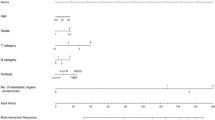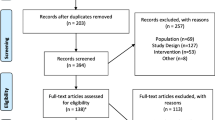Abstract
Background
Brain metastasis (BM) in gastric cancer (GC) is underestimated, and human epidermal growth factor receptor 2 (HER2) overexpression is a durable poor prognostic factor. We explored the relationship between the two and made a survival analysis.
Methods
HER2 expression and BM status were collected from GC patients who were diagnosed between December 2009 and May 2021. We collected GC patients diagnosed between 2010 and 2016 from the SEER database. The primary endpoint was survival from the diagnosis of BM. Multivariable logistic regression was used to determine potential risk factors of BM at diagnosis in SEER database. Survival analysis was performed using the Kaplan–Meier method.
Result
There were 513 HER2-positive GC patients, including 16 (3.1%) with BM. Among 38 brain metastasis GC patients we collected, 16 (42.1%) patients were HER2 positive. We collected 34,199 GC patients from the SEER database and there were 260 (0.76%) patients with BM at diagnosis. GC patients that are male, white, of younger age, with primary lesions located in the proximal stomach or with distant lymph nodes, liver, bone, or lung metastasis are more likely to develop BM. The median overall survival time from diagnosis of BM was 12.73 months, and the survival time from brain metastasis of HER2-positive patients was numerically shorter, though the difference was not significant (5.30 months vs.16.13 months, P = 0.28.)
Conclusion
The incidence of BM in patients with HER2-positive gastric cancer is 4.08 times higher than that in general patients. The median overall survival time from BM is shorter for HER2-positive patients.


Similar content being viewed by others
Data availability
The data that support the findings of this study are available from the corresponding author, QMZ and YDJ, upon reasonable request.
References
Thrift AP, El-Serag HB. Burden of gastric cancer. Clin Gastroenterol Hepatol. 2020;18(3):534–42. https://doi.org/10.1016/j.cgh.2019.07.045.
Yu M, Zheng HC, Xia P, Takahashi H, Masuda S, Takano Y, et al. Comparison in pathological behaviours & prognosis of gastric cancers from general hospitals between China & Japan. Indian J Med Res. 2010;132:295–302.
Go PH, Klaassen Z, Meadows MC, Chamberlain RS. Gastrointestinal cancer and brain metastasis: a rare and ominous sign. Cancer. 2011;117(16):3630–40. https://doi.org/10.1002/cncr.25940.
Qiu MZ, Shi SM, Chen ZH, Yu HE, Sheng H, Jin Y, et al. Frequency and clinicopathological features of metastasis to liver, lung, bone, and brain from gastric cancer: a SEER-based study. Cancer Med. 2018;7(8):3662–72. https://doi.org/10.1002/cam4.1661.
Hofmann M, Stoss O, Shi D, Buttner R, van de Vijver M, Kim W, et al. Assessment of a HER2 scoring system for gastric cancer: results from a validation study. Histopathology. 2008;52(7):797–805. https://doi.org/10.1111/j.1365-2559.2008.03028.x.
Hsu JT, Chen TC, Tseng JH, Chiu CT, Liu KH, Yeh CN, et al. Impact of HER-2 overexpression/amplification on the prognosis of gastric cancer patients undergoing resection: a single-center study of 1,036 patients. Oncologist. 2011;16(12):1706–13. https://doi.org/10.1634/theoncologist.2011-0199.
Sheng WQ, Huang D, Ying JM, Lu N, Wu HM, Liu YH, et al. HER2 status in gastric cancers: a retrospective analysis from four Chinese representative clinical centers and assessment of its prognostic significance. Ann Oncol. 2013;24(9):2360–4. https://doi.org/10.1093/annonc/mdt232.
Bang YJ, Van Cutsem E, Feyereislova A, Chung HC, Shen L, Sawaki A, et al. Trastuzumab in combination with chemotherapy versus chemotherapy alone for treatment of HER2-positive advanced gastric or gastro-oesophageal junction cancer (ToGA): a phase 3, open-label, randomised controlled trial. Lancet. 2010;376(9742):687–97. https://doi.org/10.1016/S0140-6736(10)61121-X.
Berghoff A, Bago-Horvath Z, De Vries C, Dubsky P, Pluschnig U, Rudas M, et al. Brain metastases free survival differs between breast cancer subtypes. Br J Cancer. 2012;106(3):440–6. https://doi.org/10.1038/bjc.2011.597.
Lauren P. The two histological main types of gastric carcinoma: diffuse and so-called intestinal-type carcinoma. An attempt at a histo-clinical classification. Acta Pathol Microbiol Scand. 1965;64:31–49. https://doi.org/10.1111/apm.1965.64.1.31.
Minisini AM, Moroso S, Gerratana L, Giangreco M, Iacono D, Poletto E, et al. Risk factors and survival outcomes in patients with brain metastases from breast cancer. Clin Exp Metastasis. 2013;30(8):951–6. https://doi.org/10.1007/s10585-013-9594-5.
Ahn HK, Park YH, Lee SJ, Park S, Maeng CH, Park W, et al. Clinical implication of time to brain metastasis (TTBM) according to breast cancer subtypes. Springerplus. 2013;2(1):136. https://doi.org/10.1186/2193-1801-2-136.
Kuksis M, Gao Y, Tran W, Hoey C, Kiss A, Komorowski AS, et al. The incidence of brain metastases among patients with metastatic breast cancer: a systematic review and meta-analysis. Neuro Oncol. 2021;23(6):894–904. https://doi.org/10.1093/neuonc/noaa285.
Blay C, Chiforeanu DC, Boucher E, Cabillic F, Desgrippes R, Leconte B, et al. Incidence of brain metastases in HER2+ gastric or gastroesophageal junction adenocarcinoma. Acta Oncol. 2015;54(10):1833–5. https://doi.org/10.3109/0284186X.2015.1011757.
Feilchenfeldt J, Varga Z, Siano M, Grabsch HI, Held U, Schuknecht B, et al. Brain metastases in gastro-oesophageal adenocarcinoma: insights into the role of the human epidermal growth factor receptor 2 (HER2). Br J Cancer. 2015;113(5):716–21. https://doi.org/10.1038/bjc.2015.279.
Howlader N, Altekruse SF, Li CI, Chen VW, Clarke CA, Ries LA, et al. US incidence of breast cancer subtypes defined by joint hormone receptor and HER2 status. J Natl Cancer Inst. 2014. https://doi.org/10.1093/jnci/dju055.
Limon D, Gal O, Gordon N, Katz L, Perl G, Purim O, et al. Brain metastasis in gastroesophageal adenocarcinoma and HER2 status. J Neurooncol. 2018;138(2):315–20. https://doi.org/10.1007/s11060-018-2798-4.
Hosonaga M, Saya H, Arima Y. Molecular and cellular mechanisms underlying brain metastasis of breast cancer. Cancer Metastasis Rev. 2020;39(3):711–20. https://doi.org/10.1007/s10555-020-09881-y.
Lee-Hoeflich ST, Crocker L, Yao E, Pham T, Munroe X, Hoeflich KP, et al. A central role for HER3 in HER2-amplified breast cancer: implications for targeted therapy. Cancer Res. 2008;68(14):5878–87. https://doi.org/10.1158/0008-5472.CAN-08-0380.
Blazquez R, Wlochowitz D, Wolff A, Seitz S, Wachter A, Perera-Bel J, et al. PI3K: A master regulator of brain metastasis-promoting macrophages/microglia. Glia. 2018;66(11):2438–55. https://doi.org/10.1002/glia.23485.
Tanner M, Hollmen M, Junttila TT, Kapanen AI, Tommola S, Soini Y, et al. Amplification of HER-2 in gastric carcinoma: association with topoisomerase IIalpha gene amplification, intestinal type, poor prognosis and sensitivity to trastuzumab. Ann Oncol. 2005;16(2):273–8. https://doi.org/10.1093/annonc/mdi064.
Saeki H, Oki E, Kashiwada T, Arigami T, Makiyama A, Iwatsuki M, et al. Re-evaluation of HER2 status in patients with HER2-positive advanced or recurrent gastric cancer refractory to trastuzumab (KSCC1604). Eur J Cancer. 2018;105:41–9. https://doi.org/10.1016/j.ejca.2018.09.024.
Steeg PS, Camphausen KA, Smith QR. Brain metastases as preventive and therapeutic targets. Nat Rev Cancer. 2011;11(5):352–63. https://doi.org/10.1038/nrc3053.
Kodack DP, Chung E, Yamashita H, Incio J, Duyverman AM, Song Y, et al. Combined targeting of HER2 and VEGFR2 for effective treatment of HER2-amplified breast cancer brain metastases. Proc Natl Acad Sci U S A. 2012;109(45):E3119–27. https://doi.org/10.1073/pnas.1216078109.
Wolstenholme V, Hawkins M, Ashley S, Tait D, Ross G. HER2 significance and treatment outcomes after radiotherapy for brain metastases in breast cancer patients. Breast. 2008;17(6):661–5. https://doi.org/10.1016/j.breast.2008.04.006.
Tarantino P, Carmagnani Pestana R, Corti C, Modi S, Bardia A, Tolaney SM, et al. Antibody-drug conjugates: smart chemotherapy delivery across tumor histologies. CA Cancer J Clin. 2022;72(2):165–82. https://doi.org/10.3322/caac.21705.
Yoshida J, Sugiyama K, Satoh M, Shiraishi K, Nishibori R, Kitagawa C. Efficacy of trastuzumab deruxtecan in an advanced gastric cancer patient with brain metastasis. Curr Probl Cancer. 2021;45(6):100757. https://doi.org/10.1016/j.currproblcancer.2021.100757.
Acknowledgements
We thank all the enrolled patients and their families. Role of funder statement The funding sources had no role in the design and conduct of the study; collection, management, analysis, and interpretation of the data; preparation, review, or approval of the manuscript; and the decision to submit the manuscript for publication.
Funding
This work was supported by grants from the National Natural Science Foundation of China (82073377,81772587 to MZ.Q., 82172748 to DJ.Y.), Natural Science Foundation of Guangdong (2021A1515012439 to MZ.Q.).
Author information
Authors and Affiliations
Contributions
QMZ, YDJ: design and conduct of the study. LMY, GWL, YJ: collection, management, analysis, and interpretation of the data. SYT, LSX and YLQ: investigation, methodology. LMY and GWL: resource, writing the original draft. All the authors reviewed and approved the manuscript. All the authors decided to submit the manuscript for publication.
Corresponding authors
Ethics declarations
Competing interests
The authors declare no potential conflicts of interest.
Ethics approval and consent to participate
This study was performed in accordance with the Declaration of Helsinki protocols and was approved by the Ethics Committee from Sun Yat-sen University Cancer Center with accession N.O.: B2022-633-01. All authors had access to the study data and reviewed and approved the final manuscript.
Access to data and data analysis
Miao-Zhen Qiu and Da-Jun Yang had full access to all the data in the study and takes responsibility for the integrity of the data and the accuracy of the data analysis.
Additional information
Publisher's Note
Springer Nature remains neutral with regard to jurisdictional claims in published maps and institutional affiliations.
Supplementary Information
Below is the link to the electronic supplementary material.
Rights and permissions
Springer Nature or its licensor (e.g. a society or other partner) holds exclusive rights to this article under a publishing agreement with the author(s) or other rightsholder(s); author self-archiving of the accepted manuscript version of this article is solely governed by the terms of such publishing agreement and applicable law.
About this article
Cite this article
Lai, MY., Guan, WL., Yang, J. et al. The relationship between brain metastasis and HER2 expression status in gastric cancer. Clin Transl Oncol 26, 765–773 (2024). https://doi.org/10.1007/s12094-023-03306-2
Received:
Accepted:
Published:
Issue Date:
DOI: https://doi.org/10.1007/s12094-023-03306-2




